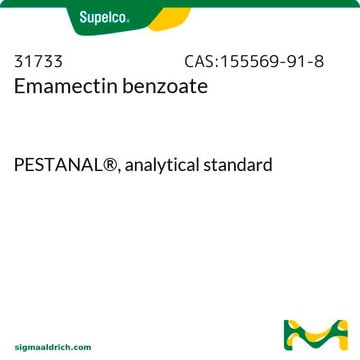32414
Trimethoprim-d9
VETRANAL®, analytical standard
Synonym(s):
2,4-Diamino-5-(3,4,5-tri(methoxy-d3)benzyl)pyrimidine
About This Item
Recommended Products
grade
analytical standard
Quality Level
product line
VETRANAL®
shelf life
limited shelf life, expiry date on the label
technique(s)
HPLC: suitable
gas chromatography (GC): suitable
application(s)
forensics and toxicology
pharmaceutical (small molecule)
veterinary
format
neat
mass shift
M+9
storage temp.
2-8°C
SMILES string
[2H]C([2H])([2H])Oc1cc(Cc2cnc(N)nc2N)cc(OC([2H])([2H])[2H])c1OC([2H])([2H])[2H]
InChI
1S/C14H18N4O3/c1-19-10-5-8(6-11(20-2)12(10)21-3)4-9-7-17-14(16)18-13(9)15/h5-7H,4H2,1-3H3,(H4,15,16,17,18)/i1D3,2D3,3D3
InChI key
IEDVJHCEMCRBQM-GQALSZNTSA-N
Application
Legal Information
related product
Signal Word
Danger
Hazard Statements
Precautionary Statements
Hazard Classifications
Acute Tox. 3 Oral - Repr. 2
Storage Class Code
6.1C - Combustible acute toxic Cat.3 / toxic compounds or compounds which causing chronic effects
WGK
WGK 3
Flash Point(F)
Not applicable
Flash Point(C)
Not applicable
Choose from one of the most recent versions:
Already Own This Product?
Find documentation for the products that you have recently purchased in the Document Library.
Customers Also Viewed
Our team of scientists has experience in all areas of research including Life Science, Material Science, Chemical Synthesis, Chromatography, Analytical and many others.
Contact Technical Service











